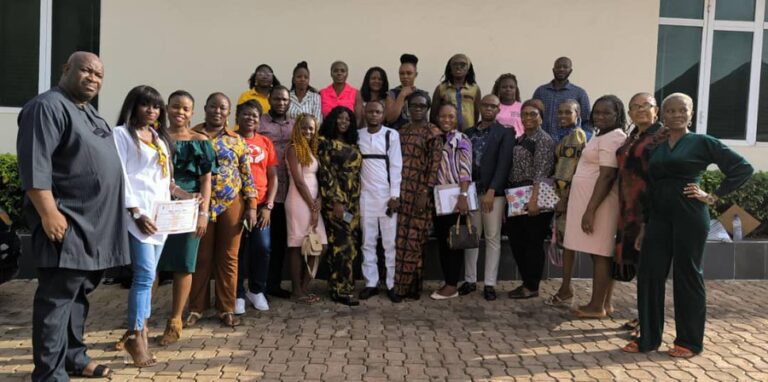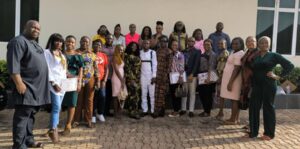Participants at a Media Rights Agenda (MRA)-organized training workshop, comprising journalists from broadcast, print and online media selected from different states across south-east and south-south geo-political zones of Nigeria have called on the media to regularly scrutinize the activities and finances of public institutions, assess the level of performance of their functions as well as evaluate their effectiveness in terms of the achievement of their set goals and objectives.
The participants made this and other recommendations at a two-day workshop for journalists on how to use the Freedom of Information (FOI) Act for investigative reporting, which took place on November 23 and November 24, 2023, in Enugu.
The workshop, attended by 30 participants, was organised by Media Rights Agenda with support from the MacArthur Foundation through the Wole Soyinka Centre for Investigative Journalism (WSCIJ) under the Collaborative Media Engagement for Development, Inclusivity and Accountability (CMEDIA) Project, a multi-level intervention that supports media independence, improved transparency, accountability, and good governance in state and local governments with more public awareness on the need for accountability, and amplified marginalised voices.
The workshop was aimed at sensitizing participating journalists and building their capacity to effectively use the FOI Act for investigative reporting by familiarizing them with the key provisions of the Act and how to make effective use of it to seek and obtain information from public institutions and other relevant entities in addition to increasing the quantity and quality of investigative reports carried out by media practitioners.
The workshop consisted of plenary presentations, brainstorming and break-out sessions during which different topics were addressed, including: an Overview and Elements of Investigative Reporting; The Role of Records and Documents in Investigative Reporting; Understanding the Freedom of Information Act, 2011; The FOI Act and Investigative Reporting; and How Journalists and the Media Can Use the FOI Act.
Other topics treated are: Fact-checking and Investigative Reporting; Making Requests for Information Under the Freedom of Information Act; Deciding What Investigative Reports to Carry Out; Interviews in Investigative Reporting; and How to Present Stories from Investigative Reporting.
The participants acknowledged that the usage of the FOI Act by journalists and the media in general has been low given its potential benefits to the media sector in seeking and obtaining information. In order to ensure that the objectives of the Act are fully realized, the participants committed to using the Act more regularly and frequently in their reporting. They called on all other media practitioners to do the same.
They noted that the media needs to do a better job of covering the activities of all public institutions, especially regulatory bodies and agencies, in order to hold them accountable to the public. They therefore urged the media to regularly scrutinize the activities and finances of public institutions, assess their level of performance of their functions as well as evaluate their effectiveness in terms of the achievement of their set goals and objectives.
They observed that journalists across Nigeria, most notably in the south-east, are witnessing frequent misuse of various laws, particularly the Cybercrimes Act, by law enforcement agents and government officials to harass them and constrain the activities of media practitioners. Such laws, they said, should be amended to include safeguards against their abuse. In the interim, journalists should be properly sensitized about the existence of such laws, the dangers they pose to journalism practice as well as measures that journalists and other media practitioners can take to avoid becoming victims of abuse.
They recommended that there should be concerted efforts by governments at different levels and other stakeholders to prevent attacks against journalists, to protect journalists who are being threatened or attacked and to ensure that perpetrators of attacks against journalists are appropriately prosecuted and punished.
The workshop concluded that for journalists and other media workers to effectively perform the duties and functions imposed on the media by Section 22 of the Constitution, it is imperative that journalists are able to gather information safely and that journalists as well as their sources of information are adequately protected against reprisals and attacks for carrying out their professional duties. Accordingly, they recommend that laws should be put in place to protect journalists from being compelled to disclose their confidential sources of information and to protect journalistic materials and equipment.
Please download and read the full communiqué here.







